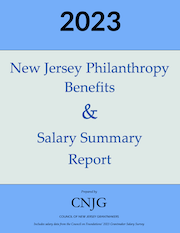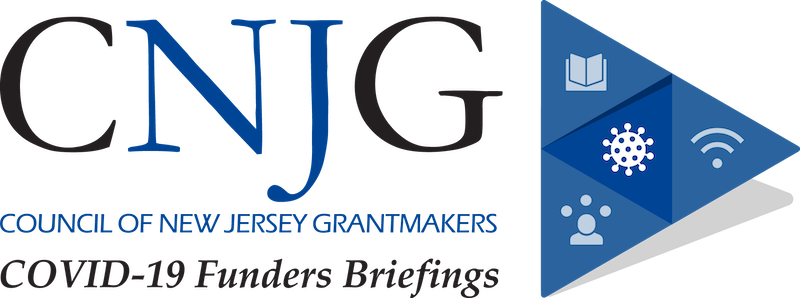Site Search
- resource provided by the Forum Network Knowledgebase.
Search Tip: Search with " " to find exact matches.
Learn about a new report on the care economy narrative change landscape in the U.S. supported by the Care for All with Respect and Equity (CARE) Fund and developed by Asset Funders Network, Economic Opportunity Funders, Early Childhood Funders Collaborative, Grantmakers In Aging, Grantmakers In Health, and Disability & Philanthropy Forum.
Coming together for the first time across issues and constituencies represented by this diverse range of PSOs, the discussion will center the evolving landscape of narrative change efforts across the care economy, lessons being learned by practitioners and by funders, and potential opportunities for further learning and action.
Cost: Free for Members and Non Members

A sample document detailing the core values of the Betty and Davis Fitzgerald Foundation including restrictions on participation on nonprofit/grantee boards.

CNJG hosts regular briefings where funders hear from government officials, disaster recovery and health experts, nonprofit leaders, funders, and other stakeholders dealing with the COVID-19 pandemic. The briefings provide an opportunity to share how colleagues are changing grantmaking practices for rapid response, learn about new policies and government actions, and connect with local leaders who work with people whose financial, physical, and mental health suffers due to COVID-19. Series I topics included food insecurity, mapping response funding, racial health disparities, federal and state policy, and updates from New Jersey response funds and Rapid Response Surveys, completed in partnership with the Center for Non-Profits in March, April, and July 2020.
Since 1998, Alliance Magazine has been the leading magazine for philanthropy and social investment worldwide providing news and analysis of what’s happening in the sector.
The latest 12 issues of Alliance are behind a paywall and are available only for subscribers, although selected articles are made freely available. The remainder of the archive is free to all.
We are pleased to partner with Alliance magazine to offer our members and your members a 20% discount on new print and digital subscriptions. Simply enter 'Forum20' at checkout to claim your discount.
Based sardonically on Masterpiece Theatre, Washington Regional Association of Grantmakers’s Structural Racism Theaterintroduces the viewer to concrete examples of structural racism and implicit bias. It’s edgy, dryly humorous, “shareable,” and an incredibly different direction for WRAG. The first episode, "The Pernicious Compromise," focuses on the timely topic of the Electoral College and its connection to the Three-Fifths Compromise.
Watch the video
The Council of New Jersey Grantmakers is pleased to release our annual look back at the Council’s robust programming, leadership initiatives and advocacy efforts. From funder briefings to our Signature events to providing New Jersey’s philanthropic sector with integral connections and services – CNJG is an engaged and cohesive network of grantmakers dedicated to our state’s communities and people.
The Council of New Jersey Grantmakers is pleased to release our annual look back at the Council’s robust programming, leadership initiatives and advocacy efforts. From funder briefings to our Signature events to providing New Jersey’s philanthropic sector with integral connections and services – CNJG is an engaged and cohesive network of grantmakers dedicated to our state’s communities and people.
2016 marked a new high mark for the Council of New Jersey Grantmakers and for our members. The 2016 President’s Report is our annual look back at CNJG’s robust programming and services in benefit to our members and by extension, the communities that our members serve. These programs, services and leadership initiatives elevate not only our members’ work and practice, but also grantmakers throughout New Jersey, and often even beyond. CNJG remains at the ready to assist New Jersey grantmakers in meeting the ongoing challenges of yesterday and today.
The 2017 President’s Report is our annual look back at CNJG’s robust programming and services in benefit to our members and by extension, the communities that our members serve. These programs, services and leadership initiatives elevate not only our members’ work and practice, but also grantmakers throughout New Jersey, and often even beyond. CNJG remains at the ready to assist New Jersey grantmakers in meeting the ongoing challenges of yesterday and today.
This year, GivingTuesday, a global generosity movement, is Tuesday, November 28. While this annual traditional is best known for highlighting charitable organizations’ missions and elevating individual giving, how can corporate philanthropy leverage these types of giving days and partnerships to engage in and promote greater impact? We’ll hear from Woodrow Rosenbaum, Chief Data Officer, GivingTuesday, who will share the history and evolution of this special day, as well as giving trends from a national perspective.
As Chief Data Officer, Rosenbaum has been instrumental in shaping the global generosity movement and has spearheaded ground-breaking research and analysis of individual giving behaviors. He leads the GivingTuesday Data Commons, bringing together a coalition of more than 300 collaborators coordinated through eight working groups as well as data teams in 50 countries to understand the drivers and impacts of generosity to inspire more giving of all types. Woodrow brings expertise in moving markets and transforming audiences from passive participants to active and vocal ambassadors. He is founder and CEO of With Intent, an international consumer marketing agency, a member of the Generosity Commission Research Task Force, serves as board chair for Global Impact Canada, and is a Fellow at the Belfer Center for Science and International Affairs at Harvard Kennedy School.
Following the presentation and Q & A, we’ll have dedicated time for corporate funders to hear from one another, share programs and projects, and learn from one another. We encourage every attendee to participate in this discussion.
Webinar Video
CNJG is pleased to offer a new member benefit: ValuesAdvisor. Many foundations now recognize that the investments made from their corpus have the power to support their mission, but don’t know how to take the first step: finding a trusted financial advisor with the right expertise. We now offer you free access to ValuesAdvisor, a nonprofit, online, searchable database of peer-recommended financial advisors who have the expertise you need. You can learn more about the platform by watching this short, 3 minute video. In this webinar with ValuesAdvisor Co-Founder Kate Simpson, you will learn about how the platform can be used to further your mission (climate, DEI, place based, etc.).
This webinar pairs nicely with CNJG’s Impact Investing Bootcamp series.
COST: Free for CNJG Members
Webinar Video
